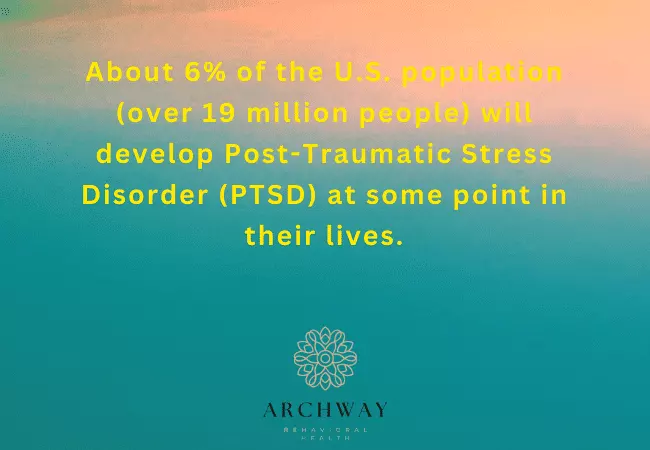Trauma doesn’t just change the way you feel—it changes the way you think, connect, and live. Whether it stems from childhood abuse, neglect, a violent event, emotional betrayal, or years of subtle invalidation, trauma can fundamentally shape your perception of the world and yourself.
And without treatment, trauma’s effects can linger quietly for years—or explode in cycles of anxiety, depression, emotional shutdown, relationship issues, substance abuse, or chronic illness.
That’s why trauma therapy is not just beneficial—it’s essential for lasting recovery and transformation.
At Archway Behavioral Health, a leading mental health treatment center in Florida, we help individuals safely process trauma using evidence-based therapies such as Dialectical Behavior Therapy (DBT) and Cognitive Behavioral Therapy (CBT) across all levels of care—including our Partial Hospitalization Program Florida and Intensive Outpatient Program Florida.
Understanding the Long-Term Impact of Trauma
Trauma is the emotional response to a deeply distressing or disturbing experience. It doesn’t have to be dramatic to be damaging—chronic emotional invalidation, neglect, or inconsistent caregiving can be just as traumatic as a violent event.
Trauma can lead to long-term symptoms such as:
- Flashbacks, nightmares, or intrusive memories
- Emotional numbing or dissociation
- Chronic anxiety or hypervigilance
- Avoidance of people, places, or emotions
- Low self-esteem or shame
- Mood swings and difficulty trusting others
- Physical symptoms like fatigue, migraines, or stomach issues
Unprocessed trauma increases the risk of mental health disorders, including PTSD, depression, anxiety, bipolar disorder, and substance use disorders—making targeted trauma therapy critical for lasting change.
Why Trauma Therapy Is Non-Negotiable for Recovery
Unlike general talk therapy, trauma-informed therapy is built specifically to help individuals safely access, process, and heal from traumatic experiences.
Here’s why trauma therapy is foundational to true healing:
1. It Heals the Nervous System
Trauma “rewires” the brain and body to stay in fight, flight, or freeze mode. Therapy calms overactive fear centers like the amygdala and restores regulation, helping you feel safe again in your own body.
2. It Repairs Emotional Awareness
Trauma survivors often suppress or disconnect from emotions as a coping mechanism. Therapy gently reintroduces emotional awareness, teaching clients how to tolerate and understand feelings without being overwhelmed.
3. It Breaks Cognitive Distortions
Trauma can lead to internal beliefs like “I’m not safe,” “I can’t trust anyone,” or “I’m unworthy.” Using Cognitive Behavioral Therapy Florida, we help clients identify and reframe these false narratives into empowering truths.
4. It Offers Safe Emotional Expression
Through individual therapy and our group therapy program, trauma survivors gain access to a safe, nonjudgmental space to process painful memories and share their stories—sometimes for the first time.
Our Trauma-Focused Programs at Archway
Healing from trauma doesn’t look the same for everyone. At Archway Behavioral Health, we offer a range of trauma-informed care options based on each person’s needs and severity of symptoms:
Partial Hospitalization Program Florida (PHP)
Our PHP offers full-day treatment 5 days a week. It’s ideal for clients who need intensive support but do not require inpatient hospitalization. Trauma therapy is woven into daily sessions, including DBT skills groups, individual therapy, psychoeducation, and mindfulness work.
Intensive Outpatient Program Florida (IOP)
Our IOP allows for step-down support with flexible scheduling. It’s a great fit for those returning to work, school, or caregiving while continuing trauma healing. Clients attend therapy 3–5 days per week and engage in DBT, CBT, and other experiential modalities.
Outpatient Support and Maintenance
After completing PHP or IOP, clients can continue weekly therapy with trauma-informed clinicians to support long-term growth and prevent relapse.
How We Integrate DBT and CBT for Trauma Recovery
Dialectical Behavior Therapy Florida
DBT is incredibly effective for trauma survivors who experience emotional dysregulation, impulsivity, and relationship challenges. Skills like distress tolerance, emotion regulation, mindfulness, and interpersonal effectiveness help stabilize symptoms and build resilience.
Cognitive Behavioral Therapy Florida
CBT helps clients reframe unhelpful thought patterns rooted in trauma. Through cognitive restructuring and behavioral experiments, clients begin to shift from avoidance and fear to empowerment and self-trust.
Breaking the Trauma Cycle—How Therapy Impacts Future Generations
Healing trauma isn’t just a personal victory—it’s a gift to future generations.
Many trauma survivors unintentionally pass on unhealed wounds through patterns like:
- Emotional unavailability
- Fear-based parenting
- Communication breakdowns
- Normalizing toxic relationships
Trauma therapy breaks this cycle by:
- Teaching self-awareness and emotion regulation
- Rebuilding secure attachment styles
- Equipping individuals to model healthy boundaries and vulnerability
- Creating an emotionally safe foundation for children, partners, and families
You don’t have to pass down what you didn’t receive. Through trauma therapy at Archway, clients not only heal themselves—they become the kind of parent, partner, or friend they never had.
Why Choose Archway Behavioral Health for Trauma Therapy?
We know that trauma recovery is complex—and deeply personal. At Archway Behavioral Health, we provide more than clinical care—we provide connection, safety, and long-term support.
Why clients choose us:
- Expert, trauma-certified clinicians
- Evidence-based care blending DBT, CBT, and holistic practices
- Structured trauma-informed programming in PHP and IOP
- Optional integration of family or relationship support
- Ongoing aftercare to support long-term healing
- A warm, inclusive space where you’re seen and respected
Conclusion
Trauma doesn’t go away just because we avoid it. But with the right care, you can process what happened, reclaim your power, and build a life rooted in peace—not survival.
Trauma therapy is essential for long-term recovery because it addresses the origin of suffering—not just the symptoms. Whether you’re dealing with emotional flashbacks, fear of connection, or a constant sense of unease, healing is not only possible—it’s waiting for you.
At Archway Behavioral Health, we help people every day turn pain into purpose, trauma into triumph. Call us today at (888) 488-4103 to speak with a care coordinator. Let’s take that first step together. Your past may shape you, but it doesn’t define you. Healing begins here.
Frequently Asked Questions (FAQ)
Who can benefit from trauma therapy?
Anyone who has experienced emotional, physical, or psychological trauma—whether recent or from the past—can benefit. This includes survivors of abuse, neglect, assault, accidents, natural disasters, loss, or chronic emotional invalidation.
How is trauma therapy different from regular therapy?
Trauma therapy focuses on the underlying emotional wounds and survival responses that traditional therapy may not fully address. It emphasizes safety, regulation, and rewiring patterns rooted in fear, avoidance, or emotional shutdown.
Is trauma therapy available at Archway Behavioral Health?
Yes. Trauma-informed care is integrated into all levels of treatment at Archway, including our Partial Hospitalization Program Florida, Intensive Outpatient Program Florida, and outpatient services. We use DBT, CBT, mindfulness, and more to support trauma recovery.
Can trauma therapy help with anxiety and depression?
Absolutely. Trauma is often the root cause of persistent anxiety and depression. Our Anxiety Treatment Program Florida and Depression Treatment Program Florida are designed to treat both the symptoms and the trauma beneath them.
How long does trauma therapy take?
Healing timelines vary by individual and trauma history. Some may see progress in a few months; others may require longer-term support. Archway offers flexible programs tailored to each client’s needs and pace.



